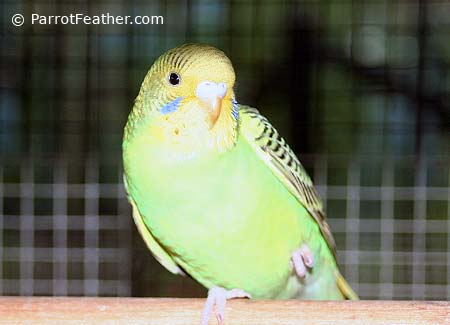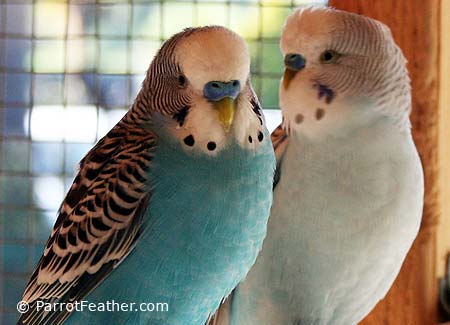[bars]

Budgies bite for many reasons, it is important to understand that biting is not natural. Budgies are social creatures and very rarely do they use their beaks to solve a problem. If a Budgie is being bullied by another Budgie, they usually get into a quick squabble and fly away. They almost never fight to kill. Budgies are usually only aggressive over nesting sites. Even after such a squabble, it very rarely leads to a brutal attack.
[ads]
So, if Budgies rarely bite, then why do they bite humans? Because biting is a learned behavior. A biting Budgie will bite out fear, territorial instincts, jealousy, or out of irritation. Before a remedy can be diagnosed, you need find out why your bird is biting. Keeping a journal of when the parrot bites is recommended. After a week of recording down your Budgies biting behavior, take a few minutes and analyze the problem. Most owners start to see patterns of biting before the journal is finished. Continue recording until you are sure you have identified the problem.
A Fearful Budgie
A Budgie that bites out of fear is scared. Most biting that is based on fear comes from being pushed beyond what the Budgie is willing to do. For example, if the Budgie was not accustomed to being held upside down, his natural reaction would be to bite. Another instance of biting out of fear is meeting new strangers. You can’t expect the bird to be placed into a stranger’s hand and not bite. Birds are not like dogs and it takes time to warm up to a stranger.
These are just two examples of biting out of fear. To avoid this type of biting, always ask yourself how the Budgie is going to react. If you know he is fearful of a person or area, slowly introduce him to the things or people that make him nervous. In time he will learn these new areas and people and begin to enjoy them.
A Territorial Budgie
At times, a Budgie can become very territorial. Though females are notorious for this behavior, males can exhibit this behavior too. A territorial Budgie will lunge and guard its cage fiercely. Just opening the door can cause the parakeet to bite. Most owners wait until their parakeet walks outside the cage before they handle the parrot. These owners also report that their parrot is gentile after being taken away from its cage.
Why has the Budgie become territorial? The answer lies in its reproductive instincts. A Budgie who guards its cage perceives it as a nesting site. Like most parrots, they cannot cope with birds, or their owners, touching their stuff. The best way to deal with this problem is to move the cage around in new locations weekly. Moving around toys also helps. Since the cage is not located in one place, like a nesting box would be, the Budgie will lose interest in guarding the it. Under no circumstances are you to wait until your parakeet steps out of the cage to hold him. If your parrot wants to leave the cage, he must step up onto your finger before being let out. Start with a towel if you think your parrot will bite and gradually introduce your finger. Praise the bird for doing what is expected.
Owners tend to avoid the problem of territorial biting by letting the bird walk outside the cage before being handled. This should not be practiced. By doing this, territorial behavior is being allowed and reinforced. The bird needs to understand the household rules, biting or any aggressiveness should not be tolerated.
A Jealous Budgie

Budgies can become jealous, especially if they have a close bond to you. Ever walk near a family member, or hold another bird, and the Budgie bites without warning? This is because your Budgie is trying to divert your attention elsewhere. The Budgie perceives that family member, or other bird as a threat to your relationship. How can the problem be addressed?
Start by introducing the person or bird to your Budgie. During the times you are not present, let the person interact with the bird. Have the person offer treats to the parrot or play games with it. If you are trying to develop a tolerable relationship between the two birds, keep the cages near each other. Though the Budgie will never develop a strong bond with the person or bird it is jealous of, it still makes the situation bearable without biting. If working with the two birds, never place them into the same cage. One can become injured.
Curing a jealous parrot takes time, none the less, it’s important you stick to a routine and solve this problem.
An Irritated Budgie
Birds do get irritated. Parrots sometimes need their space. If a parrot is tired it can quickly become cranky and moody and this can lead to biting. If your Budgie is molting and you pet a pin feather, your parrot could bite out of irritation. These are just one of the many things that can irritate you bird.
When biting out of irritation, it’s important to respect your parrot’s boundaries. Give your Budgie space, if he feels the need to be alone, let him be.
How to React
Never flick or yell at a pet Budgie for biting. These tiny birds do not understand our method of discipline and their bodies are fragile. A Budgie only perceives aggressive behavior as intimidating and yelling as stimulating. So what’s the best reaction? Ignore biting completely! Don’t make a face, don’t yell, or don’t flick the beak–do nothing. Just continue handling the bird like nothing has happened. The parrot will soon come to understand that biting is not a form of communication and should start to phase it out.
[ads]
